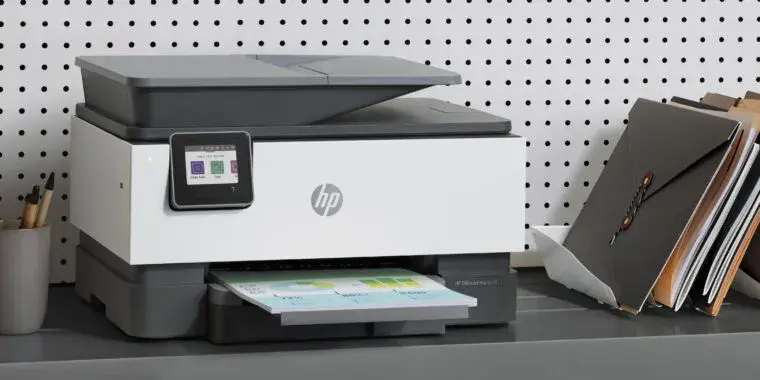- cross-posted to:
- technology@lemmy.world
- technology@lemmy.zip
- cross-posted to:
- technology@lemmy.world
- technology@lemmy.zip
Don’t ever buy HP printers. Their customer abuse is getting egregious by the day. Though, I wish there was more competition in the printer market.
I’ve had a fine experience with a Brother black and white laser printer. Just a big ugly gray block that prints my documents and my shipping labels fine. It doesn’t die regularly like those cursed HP contraptions. The cartridge goes on forever and it doesn’t blotch, wretch, coagulate or whatever the fuck inkjet cartridges do whenever you let them be for a month. I don’t miss the colors. Apparently it’s not good to print photos lol.
@luciole @tesseract I agree with this. Our light office grade Brother printer works pretty good most of the time. Sometimes it disconnects from the WiFi and needs to be reset but the ink is never an issue.
Thirded. Get an Brother inkvestment model. No bullshit, it just does your bidding, like a printer should. And the ink lasts a very long time.
Yes, everyone says get a B&W laser printer. If that fits your needs do so. We have kids that want or need to print in color fairly often, and color laser was out of the question last time we purchased.
Brother is the now only brand I look at after decades of buying consumer printers. If absolutely forced not to buy Brother, I’d go with Epson. I used to love Canon, but each model started incorporating more and more bullshit, and I found their ink to be both expensive and short lived. HP is the king of printer bullshit, but Canon seems to want to sit on their court in recent years.
Epson definitely isn’t as bad as HP but they’re easily as bad as Canon.
My last epson experience was about 5 years ago, (edit: holy cow maybe more like 10+ years ago. why does time go so fast?) so they may have gone downhill, appreciate the update. I had 2 in a row and both were good with Linux support and general lack of fussiness.
It also might be more their large format printers. I remember it being a whole thing that they’d leave ~20% of the ink in these $100 cartridges for print shops.
Oh yeah that would piss me off.
Inkvestment sounds like another scam.
OK man. Doesn’t bother me if you don’t buy one. This is the longest I’ve kept a printer without throwing it away in disgust in a long time. Companies like to brand things with catchy names. shrug
Unless they’re really into arts and crafts, there’s no good reason for a home user to buy an inkjet anymore.
If every once in a while they want a nice photo print or to print up some flyers in color or something, it’s cheaper and less overall hassle to just pay per page at a drug store or office store on those occasions.
I’ve had a fairly decent one with a Canon small-office B&W laser. It needs to be reset every so often, and it doesn’t seem to like my wife (though no printer ever does), but its apps and drivers are mostly business related, so while they are more than happy to help you buy supplies, they don’t force the issue, and the printer doesn’t care what brand of toner you shove in it. 99% of the time it’s just sitting there quietly on its LAN address, ready to print something successfully.
She just got an HP multi-function from work, and dear god that thing is annoying. It kept claiming that its own demo ink was counterfeit. Also fairly mediocre color prints.
HP has been doing this shit for ages in other spaces. When I tried to put a non-HP burner in one of their desktop computers years ago, the burner spun out of control and refused to open. Same thing happened again when I got a replacement burner. When I finally got a HP burner, it worked fine.
The same tower also refused to acknowledge an aftermarket GPU, despite changing the jumpers like guides suggested.
Don’t buy anything HP. Don’t support them at all.
Look, I fucking hate HP so don’t take this as supporting them in any way, but I don’t think what you’re describing is possible. The tower is nothing more than a bunch of mounting points to attach hardware made by other manufacturers. They don’t make motherboards or chips. They could maybe have a deal for a custom branded bios maybe with certain settings locked down. They could have some shitware installed in windows, but none of that would have an impact before windows loaded.
I just don’t see how what you’re describing is possible even if they wanted to. It would be a major scandal and everyone would’ve heard about it. Remember the Sony rootkit CDs?
Unless the front panel of HP is like Dell where the thing that looks like regular usb media reader cable is proprietary to the motherboard connectors. Even dell fans are wired differently and need adapters. Plugging Dell media reader into standard motherboard means clipping wires and soldering to standard usb. Not sure how CD drive would have proprietary though unless that plugged into something indirect of sata connection
I had an HP laptop in the early 2000s, the hard drive crashed (my wife set some mail on top of it and the mail had a large advertising magnet in it). I bought a replacement. When I opened it up, the hard drive connector was HP proprietary. A replacement drive from HP was $475 for the same size that I paid $80 for an industry standard drive. I bought a replacement laptop instead and have been warning people against HP for the last 20 years. Many people come to me for IT help (entire extended family), so I am sure I have hurt HP some. Their printer drivers are the biggest bloatware crap too. Absolutely scum company.
I can’t explain it either but it happened with 2 different CD-ROM devices until I put in an HP model one. The GPU could’ve just been a random thing, but the CD-ROM was a pretty weird coincidence. Trust me, it made no fucking sense to me either, but it’s only ever happened to me with that HP tower and I’ve built a handful of PCs myself. If someone had a better explanation (2 faulty non-HP drives in a row?), I’d accept that too.
For context, this was probably around 2001 or 2002.
Do someone else’s point. HP does have a custom BIOS they develop themselves.
Not sure about GPUs and desktops, but they did lock out all but specific wireless adapters in the laptops. This was done in the custom BIOS.
HP and/or Compaq used to make their own PCs in the 90’s going into the 2000’s.
For example they used to have special motherboards that were basically backplanes and CPU cards to suit.It’s quite possible they did dumb shit with IDE connectors/pinouts that meant that some devices didn’t work.
It wouldn’t have been a major scandal, it just would have been, “yeah some aftermarket drives don’t work with HP”, which was pretty common across the entire market back then. We’re basically in the golden age of system compatibility right now, things were an absolute shitshow back then.
Honestly, I figured it was just some wonky shit with those cheap Pavilion parts and didn’t think much of it at the time. I was mostly just annoyed that I couldn’t really do much of anything with the tower. All was well when I could finally afford to build my own!
There’s a reason their printers are always the cheapest in the store, don’t fall for it, go for ANYTHING else.
deleted by creator
The best consumer level printer I have ever had has been a cheap brother printer. The expensive ones suck but if you need black and white laser printer they are solid for years.
HP, as well as being hostile to its customers, is also complicit in the Israeli occupation, and is a major target of the BDS movement: https://bdsmovement.net/boycott-hp
Don’t buy HP products.
deleted by creator
🤖 I’m a bot that provides automatic summaries for articles:
Click here to see the summary
HP has used its “Dynamic Security” firmware updates to “create a monopoly” of replacement printer ink cartridges, a lawsuit filed against the company on January 5 claims.
Additionally, the lawsuit highlights the fact that the use of non-HP ink cartridges doesn’t break HP’s printer warranty.
Last month, HP CFO Marie Myers praised the company’s movement from transactional models to forcing customers into continuous buys through offerings like Instant Ink, HP’s monthly ink subscription program.
The new lawsuit claims that HP’s firmware updates forced customers to buy HP-brand ink that costs more than competitors.
When reached for comment, Peggy Wedgworth, a senior partner at the Milberg law firm and one of the lawyers representing the plaintiffs in this case, told Ars Technica:
The lawsuit accuses HP of raising prices on its ink “in the same time period” that it issued its late 2022 and early 2023 firmware updates, which "create[d] a monopoly in the aftermarket for replacement cartridges, permitting [HP] to raise prices without fear of being undercut by competitors.
Saved 74% of original text.











